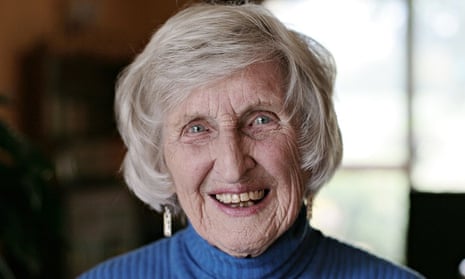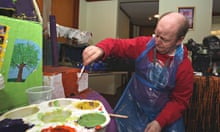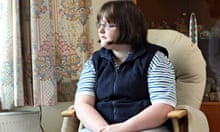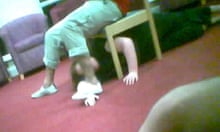After half a century and at the age of 87, Janet Carr has just completed the world’s longest-running research project into people with Down’s syndrome.
The longitudinal study began with 54 babies born in the year to November 1964 and living with their families in a part of south-east England. Driven by an interest in people and behaviours and a sharply inquisitive mind, Carr’s aim was to establish the children’s educational needs using intelligence tests such as pattern-matching. The research, which began when the babies were six weeks old, was conceived by the Medical Research Council psychiatric genetics research unit at London’s Maudsley Hospital. It was initially intended to last just 10 months but the young researcher wanted to look longer term and explore family interactions.
“I thought, as well as looking at how the little people are, I’d like to look at how it affected their families. It was widely accepted that having a baby with a disability meant that it would be a disaster, that families would break up. That’s what I expected to find,” she recalls. In fact Carr discovered that, while the babies’ development was slower than their non-disabled peers, families coped well as the children grew, with youngsters bonding and developing good relationships with their brothers and sisters.
This was at a time when the “intellectually handicapped”, as people with Down’s syndrome were then known, were regarded as non-persons to be consigned to institutions.
Carr wrote up the research as her doctoral thesis in 1970-71. Although she assumed the project was over, she began sending birthday cards – something she continues to this day. “I wonder what I had in mind writing on birthdays … maybe subliminally [I knew I’d continue],” she says smiling.
Carr resumed the study when the youngsters were 11. By now, some families were struggling but by the time the young people were 21, Carr, found them more independent. “I’d hear: ‘He can do so much more for himself now.’”
When the participants reached 30, Carr found 60% of parents – themselves ageing – were still full-time carers, and this was physically and financially stressful. Generally, between 21 and 45, there was little change in verbal and non-verbal ability says Carr – who continued her research after retirement – although she started to notice some memory loss in people in their 30s.
She is close to the families and regards her work as a collaborative success: “It is they who have made all of this … I hope they are all proud of it.” Her 1995 book, Down’s Syndrome: Children Growing Up, is dedicated to “all the young people, and their families, who have been my friends since 1963 and taught me so much”.
She smiles at the thought of “fun and feisty” Freddie, recalling visiting him when he was 21: “I went to see him at his mother’s house and he said: ‘You time me going round this field.’ He wanted to try and break the four-minute mile.” Richard Brown, involved in the study with daughter Catherine, says of Carr: “No one can quite do what she’s done. It’s amazing that Catherine still gets birthday and Christmas cards – Janet Carr is just that kind of a person.”
Carr’s body of work and professional reputation are formidable (she has written several books and more than 60 book chapters and academic papers), however, her demeanour is anything but. She laughs that her son suggested her academic journal editors should expedite publication of the 50-year findings: “You’d better hurry up – she might die!”
Carr’s study has developed amid huge changes in policy, legislation and attitudes relating to people with learning disabilities. The term “mongolism” was widely used until the World Health Organisation dropped it in 1965, leading to the adoption of “Down’s syndrome” after Victorian physician John Langdon Down who identified certain patients with similar characteristics.
When Carr embarked on her study, children with Down’s syndrome were among those deemed “ineducable” under the 1944 Education Act (legislation in 1970 gave a legal right to education). Carr’s indignation seems as strong as it must have been in 1964: “They used to say: ‘They’re never likely to walk or talk’ – and of course they did!”
She welcomes the closure of long-stay institutions, but questions the reality of life in the community as people age. “People are now stuck in [supported living] houses with few people. They don’t go and see their friends, their siblings or parents would take them – now no one is there to take them [as family members age or die]. I’ve seen their horizons widen and now they’re contracting.”
There are an estimated 60,000 people with Down’s syndrome in the UK. With medical advances, some are living into their 70s and beyond. Carr’s latest research will shed light on the ageing population, their condition and the general impact of ageing.
Lady Sheila Hollins, chair of the British Medical Association’s board of science, and a former colleague of Carr’s at St George’s hospital, London, stresses the importance of Carr’s work: “The latest findings on dementia are of particular note as it’s hoped that anything we learn from studies of dementia in Down’s syndrome might lead to helpful, therapeutic interventions for everyone.”
Hollins recently hosted an event at the House of Lords to honour Carr. She praises her focus, determination and questioning mind, as well as her “incredible bond” with the people involved in her study.
Out of the original cohort of 54 families, 29 remained, some died and others gradually dropped out of the research. Once the 50-year follow-up is published, Carr will pass the research mantle to Chris Oliver, professor of neurodevelopmental disorders at the University of Birmingham (Carr examined his PhD some 30 years ago). She, meanwhile, plans to write an accessible, non-academic book about her work.
What is Carr’s greatest hope for people with Down’s syndrome? Without hesitation she replies: “I would like it to become more real that people really have a place in ordinary life.”
Curriculum vitae
Age 87.
Family Widowed, three children, five grandchildren.
Lives Surrey.
Education Moira House school, Eastbourne; University of Reading, BA psychology; Maudsley hospital, London, diploma in clinical psychology; Institute of Education, London University, PhD.
Career 1992-present: completing longitudinal study of people with Down’s syndrome; 1982-92: regional tutor, psychology of learning disability, St George’s hospital, London; 1978‑82: senior research officer, Institute of Education, University of London; 1970‑78: lecturer, Institute of Psychiatry, University of London, and senior psychologist, Bethlem Royal hospital, London; 1964-69: research assistant, Medical Research Council psychiatric genetics research unit, Maudsley hospital, London; 1961-63: psychologist, Royal Alexandra hospital, Brighton; 1950-55: child and adult psychologist, Crayford child guidance clinic, Kent, and Maudsley, Goodmayes and Charing Cross hospitals, London.
Interests Family, Jane Austen, Mozart, tennis, cats and horses.











Comments (…)
Sign in or create your Guardian account to join the discussion